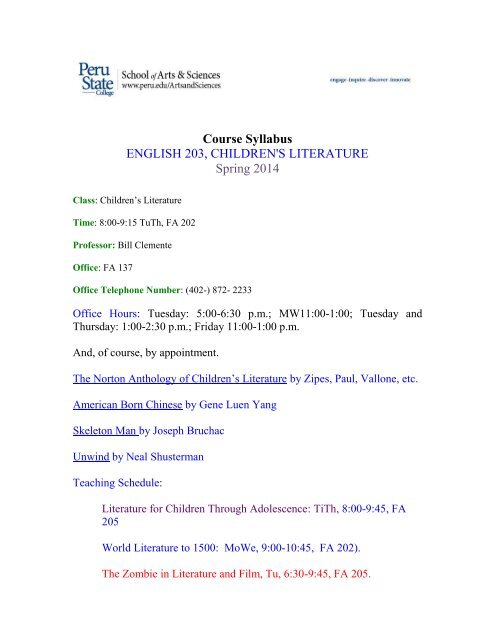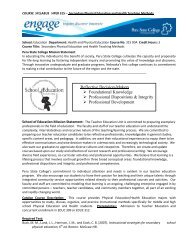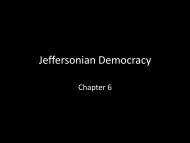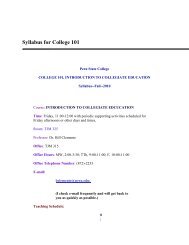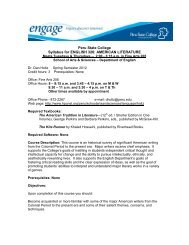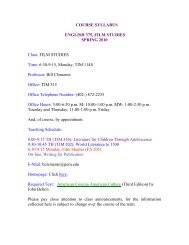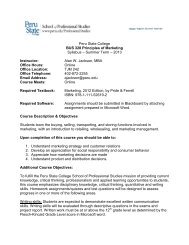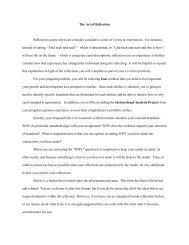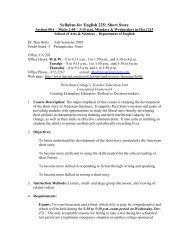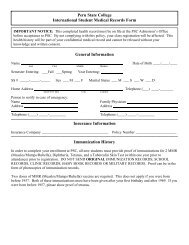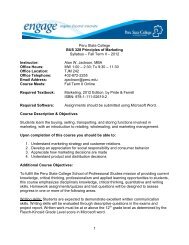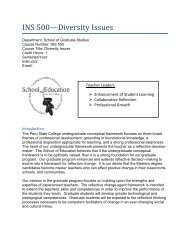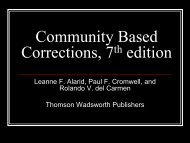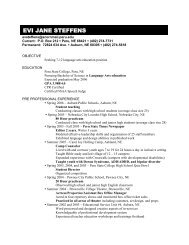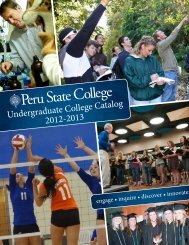Course Syllabus ENGLISH 203, CHILDREN'S LITERATURE Children
Course Syllabus ENGLISH 203, CHILDREN'S LITERATURE Children
Course Syllabus ENGLISH 203, CHILDREN'S LITERATURE Children
Create successful ePaper yourself
Turn your PDF publications into a flip-book with our unique Google optimized e-Paper software.
<strong>Course</strong> <strong>Syllabus</strong><strong>ENGLISH</strong> <strong>203</strong>, <strong>CHILDREN'S</strong> <strong>LITERATURE</strong>Spring 2014Class: <strong>Children</strong>’s LiteratureTime: 8:00-9:15 TuTh, FA 202Professor: Bill ClementeOffice: FA 137Office Telephone Number: (402-) 872- 2233Office Hours: Tuesday: 5:00-6:30 p.m.; MW11:00-1:00; Tuesday andThursday: 1:00-2:30 p.m.; Friday 11:00-1:00 p.m.And, of course, by appointment.The Norton Anthology of <strong>Children</strong>’s Literature by Zipes, Paul, Vallone, etc.American Born Chinese by Gene Luen YangSkeleton Man by Joseph BruchacUnwind by Neal ShustermanTeaching Schedule:Literature for <strong>Children</strong> Through Adolescence: TiTh, 8:00-9:45, FA205World Literature to 1500: MoWe, 9:00-10:45, FA 202).The Zombie in Literature and Film, Tu, 6:30-9:45, FA 205.
On-line, Writing for Publication, First Eight WeeksE-Mail: bclemente@peru.eduHomepage: Click herePlease pay close attention to class announcements, for the information collected here issubject to change over the course of the term.<strong>Course</strong> Description and Objectives: This course provides a survey of literature forchildren through adolescence with an emphasis on applying the principles of valuation toselected books from both traditional and modern picture books, poems, and stories.As a quick glance at your major anthology's table of contents emphasizes, you will read arich variety of material this term. In addition to fairy tales, folk tales, and myths, thecourse investigates some of the following material: picture books, poetry, science fiction,modern fiction, fantasy, non-fiction, and drama.This course focuses on literature for children from preschool through adolescence; andthe course seeks to give you both an appreciation of the literature's worth and theconfidence necessary for you to present the material in a classroom setting.To that end, we will read a wide variety of literature from various genres and discuss howchildren respond to the stories and how you can meet their specific needs. You will find,among other things, that the literature is far from simple and, properly presented, can playa major role in a young person's education.In addition to reading assignments in our texts, you will read and comment on threechildren's books of your choice. As your anthology of fairy tales indicates, our modernstories often find their roots in classic fairy tales, narratives that continue to engagereaders of all ages. And looking at Internet links to award-winning literature will provideyou with wonderful reading choices found at most libraries.<strong>Children</strong>'s Literature identifies a significant field of study and, if properly presented toyoungsters, teaches them a great deal about themselves, their culture, and the worldaround them. The class likewise provides excellent reading for all members of the classfor the writings appeal to both children and adults.This semester, we also read a novel by Gene Luen Yang, an award-winning author of agraphic novel for adolescents, and a dystopian novel Unwind by Neal Schusterman anovel that earned multiple awards. In addition, we will read this term the modernAmerican Indian folk tale Skeleton Man by Joseph Bruchac.You will also have an opportunity to read a novel of your choice for your book analysisreports. As you will come to realize through class discussion and by reading essays about
the literature included in your anthologies, this literature addresses concerns that affectyoungsters on a daily basis, both personal and social.The class also offers a helpful history of <strong>Children</strong>'s Literature and the multiple issues andcontroversies that inform this important literature. And we will discuss questions abouthow adolescents in particular engage in and even compose narratives.Other Goals and Objectives: Literature for <strong>Children</strong> Through Adolescence seeks, ofcourse, to make you a better teacher of literature after you graduate from Peru State andbegin your professional careers.The course will also make you a better reader of all literature; for while what is oftencalled "Kiddie Literature" does focus on readings for youngsters, you will find that thisliterature is very sophisticated and comes in many forms, most of which appeal likewiseto adults.The literature also connects with issues at the center of social change and conflict, fromquestions about single-parent families to the need for our children to become better awareof the different cultures that make up the world around them. Thus, while the courseseeks to fulfill the English Department's goal to produce knowledgeable and effectiveteachers, Literature for <strong>Children</strong> Through Adolescence also reinforces the college'smission to graduate informed citizens.Given that students also write numerous essays, the class also supports the GeneralEducation goals to develop effective critical writing and thinking skills.Upon completion of this course you should be able to:1. Discuss with some confidence the history of this engaging literature.2. Appreciate the sophistication of the various genres of <strong>Children</strong>'s Literature,from Fairy Tales to YA Fiction.3. Understand the importance of this literature and the recurring conflicts ittriggers.4. Read and discuss with enhanced understanding this significant literature.5. Show improvement in writing and analytical skills.At the beginning of the course, we will discuss how these objectives fit into the College’sand School’s mission and goals.Expectations & Instructional Approach
In addition to lecture materials offered by the instructor, students in this class will engagein discussions over reading material. Using films and other media, the instructor and theclass will work to grasp the significance of this literature often seen as simple, from thecomplexity of Picture Books to the importance of Fairy Tales.Assessment Methods and Student RequirementsGrades: Your grade will be based upon the following (subject-to-change) percentages:Attendance: 10Quizzes: 16Essay: 24Midterm Examination: 25Final Examination: 25Grading Policy:A 90-100B+ 86-89B 80-85C+ 76-79C 70-75D+ 66-69D 60-65F Below 60Quizzes: Every two weeks, you will take short quizzes over the assigned readings--youmust take these quizzes during the week assigned and in the time allotted. Thesemultiple-choice/true-false tests seek to ensure that each of you keeps up with the assignedreadings.If you read carefully, take notes, and watch the quiz-review videos, you should do verywell on these quizzes.In general, quizzes will be available from Thursday afternoon until Sunday at midnightevery two weeks.Attendance: Come to class prepared to take part in discussions, for they will help yougenerate ideas for your essays on the exams and for short writing assignments. Failing toattend class on a regular basis will hinder your progress.If you must miss class, contact me or a member of the class to get the assignment; allassignments will be posted on the class web page and on Blackboard.
Attendance counts for 10% of the final grade, and each of you begins the semester with agrade of A, 100%, for attendance. Not attending class lowers this grade at the rate of 5%for the first two absences and 10% for each subsequent non-attendance.<strong>Children</strong>’s Literature is a discussion class, so come to class prepared to talk about thematter at hand and to enjoy interacting with your fellow readers.Essay Assignments: Over the course of the semester, you will also write essays overclass material. Two of the essays, both part of the two exams, concentrate on the novelswe read in class.You will write another essay, and here you have choices: you can compose an essay overa contemporary Alphabet Book or Fairy Tale we have not discussed in class. You canalso write an essay about a contemporary adolescent novel directly related to areas weaddress in class: Fairy or Folk Tale; Mythology, Science Fiction or Fantasy.We will discuss this three-four page essay in class. The information in Book AnalysisReports will help you organize your essay due before Week Twelve of the term; thestudent essays will also help you.Revisions: For most written assignments, you will have an opportunity to revise workand to elevate the grade.Bear in mind, however, that a rewrite does not automatically raise the essay's grade. If therevised essay receives a higher mark than the original, the better grade goes into thebook, replacing the earlier effort. A revision never lowers your grade.Plagiarism: Do your own work. Read the statement on Academic Dishonesty later in thisdocument.Plagiarism comes in a number of forms--from using another person's work to cutting andpasting without source acknowledgment from the Internet.Plagiarism will result in a zero for the assignment and will if repeated result in failure ofthe class.If you have questions about plagiarism, see me.ATTENTION: In general, revisions are due a week after the assignment is returned.Peer Evaluation: I will post from time to time some class work on the class web page tohelp all of you compose effective revisions.
These readings will also expand your knowledge of and appreciation of the coursematerial.Due Dates and Late Material: Turn in all work on assigned dates. If you must turn insomething after the due date, let me know in advance.Turn in all written work using the appropriate link(s) on Blackboard.Grades for unexcused late work will be lowered at the rate of one-half a grade foreach day after the initial due date. Pleases turn in all work on time.Incomplete <strong>Course</strong>work PolicyTo designate a student’s work in a course as incomplete at the end of a term, theinstructor records the incomplete grade (I). Students may receive this grade only whenserious illness, hardship, death in the immediate family, or military service during thesemester in which they are registered prevents them from completing courserequirements. In addition, to receive an incomplete, a student must have completedsubstantially all of the course’s major requirements.Unless extenuating circumstances dictate otherwise, students must initiate requests for anincomplete by filling out an Incomplete Grade Completion Contract, which requires thesignature of the student, instructor, and Dean. The Incomplete Grade Completion contractcites the reason(s) for the incomplete and details the specific obligations the student mustmeet to change the incomplete to a letter grade. The date by which the student agrees tocomplete required work must appear in the contract. The Dean, the instructor, and thestudent receive signed copies of the Incomplete Grade Completion Contract.Even if the student does not attend Peru State College, all incomplete course work mustbe finished by the end of the subsequent semester. Unless the appropriate Dean approvesan extension and if the student does not fulfill contract obligations in the allotted time, theincomplete grade automatically becomes an F.Academic Integrity PolicyThe College expects all students to conduct themselves in a manner that supports anhonest assessment of student learning outcomes and the assignment of grades thatappropriately reflect student performance. It is ultimately the student’s responsibility tounderstand and comply with instructions regarding the completion of assignments,exams, and other academic activities. At a minimum, students should assume that at eachassessment opportunity they are expected to do their own original academic work and/orclearly acknowledge in an appropriate fashion the intellectual work of others, when suchcontributions are allowed. Students helping others to circumvent honest assessments of
learning outcomes, or who fail to report instances of academic dishonesty, are alsosubject to the sanctions defined in this policy.Instances of academic dishonesty may be discovered in a variety of ways. Facultymembers who assign written work ordinarily check citations for accuracy, run data baseand online checks, and/or may simply recognize familiar passages that are not cited. Theymay observe students in the act of cheating or may become aware of instances ofcheating from the statements of others. All persons who observe or otherwise know aboutinstances of cheating are expected to report such instances to the proper instructor orDean.In order to promote academic integrity, the College subscribes to an electronic service toreview papers for the appropriate citations and originality. Key elements of submittedpapers are stored electronically in a limited access database and thus become a permanentpart of the material to which future submissions are compared. Submission of anapplication and continued enrollment signifies your permission for this use of yourwritten work.Should an occurrence of academic misconduct occur, the faculty member may assign afailing grade for the assignment or a failing grade for the course. Each incident ofacademic misconduct should be reported to the Dean and the Vice President forAcademic Affairs (VPAA). The VPAA may suspend students for two semesters found tobe responsible for multiple instances of academic dishonesty. The reason for thesuspension will be noted on the student’s transcript.A faculty member need present only basic evidence of academic dishonesty. There is norequirement for proof of intent. Students are responsible for understanding these tenets ofacademic honesty and integrity. Students may appeal penalties for academic dishonestyusing the process established for grades appeals.Title IX Compliance NoticePeru State College is an equal opportunity institution. PSC does not discriminate againstany student, employee or applicant on the basis of race, color, national origin, sex,disability, religion, or age in employment and education opportunities, including but notlimited to admission decisions. The College has designated an individual to coordinatethe College’s nondiscrimination efforts to comply with regulations implementing TitleVI, VII, IX, and Section 504. Inquiries regarding non-discrimination policies andpractices may be directed to Eulanda Cade, Director of Human Resources, Title VI, VII,IX Compliance Coordinator, Peru State College, PO Box 10, Peru, NE 68421-0010,(402) 872-2230.Students requesting reasonable accommodation and tutoring services should contact theCenter for Achievement and Transition Services (CATS).
Tentative <strong>Course</strong> Schedule:We will study the following areas, in the following order, and for the approximate andsubject-to-change time periods indicated in the assignments:History, Alphabets, Chapbooks, Primers and Readers: Three WeeksFairy Tales and Novel: Three WeeksAnimal Fable, Myths, Legends, Novel: Two WeeksFantasy and SF and Novel: Two WeeksPicture Books, Comics, Graphic Novel: Three WeeksGraphic Novel, Play, Poetry: Two WeeksAnd Finally: You grades will be posted on Blackboard, where you will also turn in allyour class work using Word.I look forward to an excellent term.


